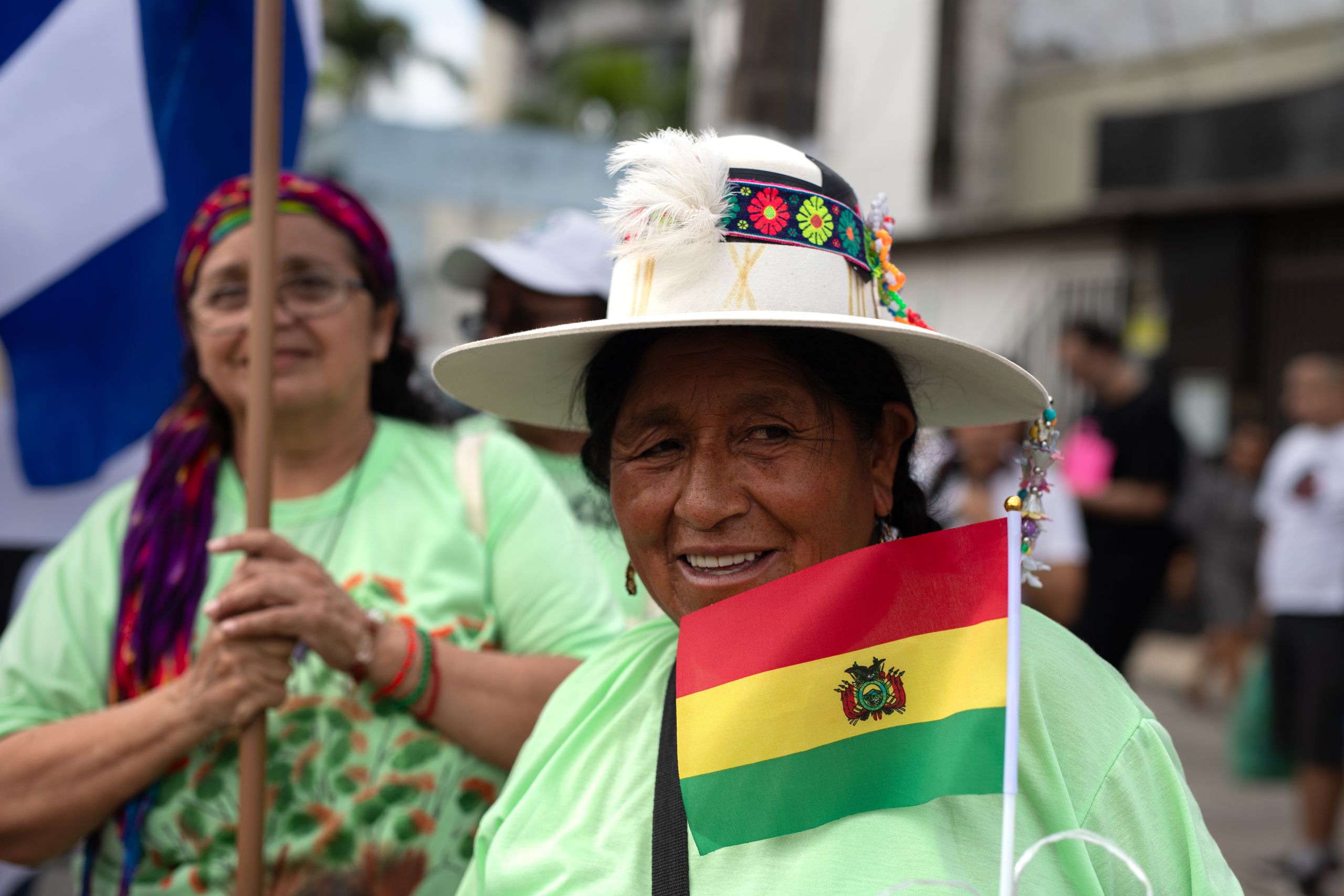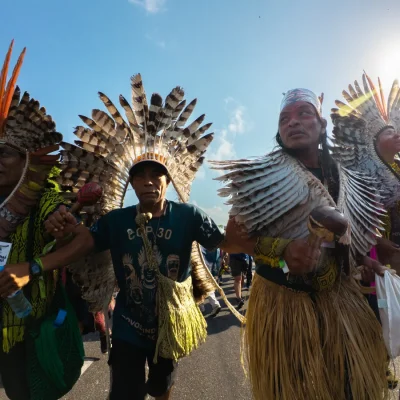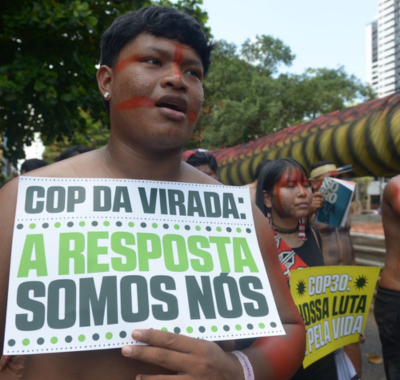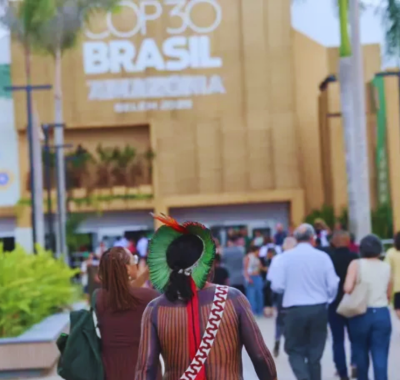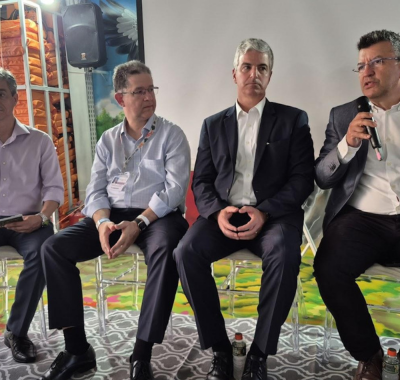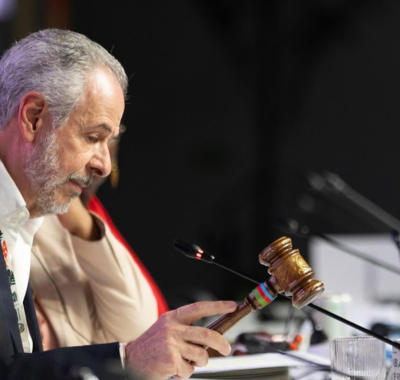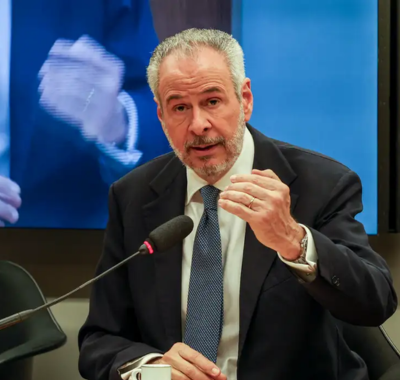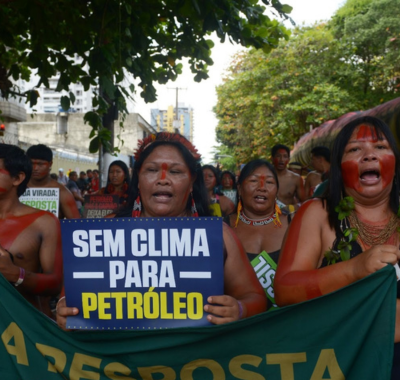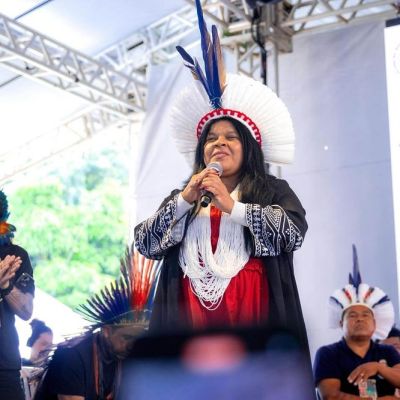People’s Charter delivered to the COP president after mobilization gathering thousands in Belém
Document lists demands drawn up over a week of debates. André Corrêa do Lago pledged to take it to official negotiations.
Author: Gabi Coelho
Translation: Roberto Cataldo/Verso Tradutores
The People’s Summit towards COP30 concluded its program this Sunday (16) with the official delivery of the People’s Charter to the president of the climate conference, Ambassador André Corrêa do Lago. The document lists 15 points and summarizes the demands drawn up over a week of debates that gathered thousands at the Federal University of Pará (UFPA), including representatives from 62 countries, Indigenous Peoples, quilombola communities, small-scale fishers, social movements and civil society organizations.
The act of delivery was the moment when the demands drawn up in the territories formally reached the official sphere of COP30. Corrêa do Lago pledged to make sure that the document is read at the negotiation space of the conference on Monday (17).
Brazil’s Minister of the Environment and Climate Change, Marina Silva, read a message from President Lula to participants. “COP30 would not be feasible without your participation – this extraordinary concentration of people who believe that another world is possible and necessary,” the text read.
The president stressed that the fight against climate change “needs the mobilization and contribution of society as a whole and not just governments” and announced his return to Belém on November 19 for a meeting with the Secretary-General of the United Nations.
Silva highlighted the progress in the government’s environmental policies and reasserted their commitment to end deforestation by 2030. “Fires have been reduced by 88% in the Amazon, 90% in the Pantanal, and 48% in the Cerrado,” she said, recalling the fires that had covered the country in smoke the previous year.
Kayapó Indigenous leader Chief Raoni was present at the beginning of the presentation and greeted the people.
One of the most striking moments of the ceremony was the speech by Cthe hildren’s Summit’s representatives. Children and teenagers from riverside communities, Indigenous territories, quilombola communities, and the urban outskirts of Pará and other regions of Brazil took the stage, chanting “Free territories, protected children!” and “Every childhood matters!”. A teenager read the group’s letter under the emotional gaze of Marina Silva and Minister of Indigenous Peoples Sonia Guajajara, a leader of the Guajajara people and the first Indigenous woman to hold the position in Brazil.
“We decided to write this letter because we want the world to hear our voice and to know what we feel in our bodies and in our daily lives,” the young man said. The text described the concrete impacts of the climate crisis on children’s daily lives: headaches, dizziness, schools without ventilation or shade, and the sadness of seeing “trees falling, smoke from wildfires, rivers full of garbage, animals suffering.” “All that affects us,” he concluded.
Corrêa do Lago thanked the People’s Summit for its work and promised to bring the contributions to the Conference’s plenary session.
“I will submit this tomorrow at the opening of the COP high-level meeting. I’m very, very happy to be able to preside over this COP with the support I’m feeling here today,” he said.
Pressure at COP doors
The letter was delivered after a week marked by constant pressure from indigenous peoples to participate in climate decisions within the conference.
On Tuesday (11), indigenous protesters and activists entered the Blue Zone – a restricted area for negotiators and delegations – shouting slogans calling for taxing billionaires and against oil exploration at the Amazon river mouth, among other demands. On Wednesday (12), a 200-vessel flotilla sailing through Guajará Bay marked the official start of the People’s Summit.
On Friday (14), Munduruku indigenous people organized by the Ipereg Ayu Movement protested at the main entrance of the conference, demanding that the executive order privatizing waterways on the Tapajós River be revoked and urging the government to demarcate their territories. The site was only cleared after Munduruku leaders were received by COP30 executive director Ana Toni, Corrêa do Lago and ministers Sônia Guajajara (Indigenous Peoples) and Marina Silva (Environment and Climate Change).
Following the action, the federal government announced that it will move forward with the demarcation of the Munduruku people’s Sawré Muybu and Sawré Ba’pim Indigenous Lands in Pará. Furthermore, they committed to analyzing the impacts of large-scale infrastructure projects in the Tapajós Basin, as reported by InfoAmazonia.
From plenary sessions to the streets
The construction of the final document revolved around six convergent topics that guided the debates and assemblies of the Summit throughout the week. These topics addressed living land and maritime territories, people’s and food sovereignty; historical reparation and the fight against environmental racism and false solutions; a just, popular, and inclusive transition; democracy and internationalism of the peoples; just cities and vibrant urban outskirts; and popular feminism and women’s resistance in the territories.
In the debate on popular and food sovereignty, agroecology emerged as “necessary for the production of low-impact food systems that contribute to the defense of the planet through carbon sequestration, but also through the elimination of greenhouse gas emissions by ending fires and pesticides.”
As for the topic of popular feminism and women’s resistance in the territories, Heidiany Moreno from the Instrelas Institute – the moderator of the panel “Amazon, Disputes and Large Enterprises” – stated that climate justice is intertwined with gender justice.
“We reaffirm that there is no climate justice when women continue to die from obstetric violence, when their territories are contaminated, when deforestation and large-scale projects destroy rivers, food, medicinal plants and the community networks that sustain life,” she said.
The People’s Summit closed its program of assemblies and plenary sessions on Friday (14).
People in the streets of Belém
On Saturday (15), the Global March for Climate Justice brought thousands to the streets of Belém. The 4.5-kilometer route started at São Brás Market and continued to Aldeia Cabana in the Pedreira district, gathering delegations from all continents.
The mobilization demanded an end to false climate solutions such as carbon credits and geoengineering, which the organizers see as allowing large emitters to continue polluting while traditional communities bear the impacts.
The main demands include immediate demarcation of indigenous and quilombola lands, historical reparations from rich countries and corporations, and recognition of the role of maritime territories in defending the Amazon and the oceans.
Helena Maltez, from the Network of Women Agroforesters of Pará and the Agroforest Task Force, stated that “agroforests are the solution” and stressed that “agroforests do not exist without culture, without people, without territory,” advocating urgent changes in the way food is produced.
For Célia Pinto, from the National Coordination of Quilombo Aconáque, MA, COP30 will only make progress if it listens to the people who live with the impacts of the climate crisis: “If these COPs don’t listen to the populations that are really affected, it will just be blah blah blah,” she said. “We are the solution to the climate crisis.”
Neuza Maria Bezerra Oliveira, from the Interstate Movement of Babassu Coconut Breakers, pointed out the need to be heard and the devastation of their territories. “I hope they see us and we prove that we exist and produce,” she said. “Our babassu groves are being destroyed.”
Elpidio da Glória Torres, leader of the Union of Workers and Family Agents of Baião, PA, summarized the central topic of the mobilization. “We want a free Amazon, based on ecology, without destroying nature,” he said, sustaining that people are not asking for concessions but rather for “ecology with sustainability.”
Coming from Chile, Yohana Coñuecar Llancapani, a Mapuche Huilliche woman and head of the Network of Indigenous Women for the Defense of the Sea, reinforced the defense of marine territories.
“Indigenous peoples did not cause the climate crisis. We will defend our territories -including marine ones – with our lives, if necessary.”
She demanded responsibility from governments in negotiations: “We don’t want our rights to regress. Governments must stop negotiating behind our backs and commit to taking care of the territories.”
Still on Sunday (16), the People’s Summit held a Banket-Rally in República Square, with free distribution of food to the population – a response to the dismantling of food security policies and the return of hunger in Brazil. In the Summit’s program, the demonstration underscored the connection between climate justice and food sovereignty, stating that extreme weather events worsen food insecurity in the territories.
What is at stake
The People’s Charter reached the hands of COP30’s president amidst pressure for official negotiations to incorporate demands from the Global South. The document criticizes the current collapse of multilateralism and false market solutions, directly holding countries of the Global North and transnational corporations responsible for the multiple crises. It also expresses solidarity with people under imperial attack, especially Palestinians, and rejects the advance of fascism and wars.
The main proposals include demarcation of indigenous territories, popular land reform, combating environmental racism, the end of fossil fuel exploitation, and a just and sovereign energy transition. The text demands that climate finance not go through institutions such as the IMF and the World Bank, arguing that countries of the North should pay their historical socio-environmental debt. It also calls for protecting human rights defenders, ending criminalization of social movements, and valuing care work as central to the reproduction of life.
The declaration concludes by calling for people’s struggles to unite under internationalism, focusing on territorial organization as a strategy of resistance. It places feminism and ancestral knowledges as pillars of a political project alternative to the current capitalist, racist, and patriarchal model.
The movements expect that Corrêa do Lago’s commitment to submit the document to COP30 will translate into concrete influence on the conference’s decisions, ensuring that the voices of the territories are not restricted to parallel spaces.
Pablo Neri, a member of the national leadership of the Landless Rural Workers’ Movement (MST) in Pará, commented on the movement’s opposition, alongside other organizations, to the proliferation of fossil fuel use and oil exploration on the equatorial margin of the Amazon.
For Neri, a just energy transition cannot be guided by corporate interests. “We don’t believe in initiatives linked to the financial market,” he says, “We have proposed alternatives such as payment for environmental services to study impacts, demarcation of indigenous and quilombola lands as a priority, and other initiatives that promote sustainable development.”
—
This report was produced by InfoAmazonia through the Collaborative Socio-environmental Coverage of COP 30. Read the original report at: https://infoamazonia.org/2025/11/16/carta-dos-povos-e-entregue-a-presidente-da-cop-apos-mobilizacao-que-reuniu-milhares-de-pessoas-em-belem/

